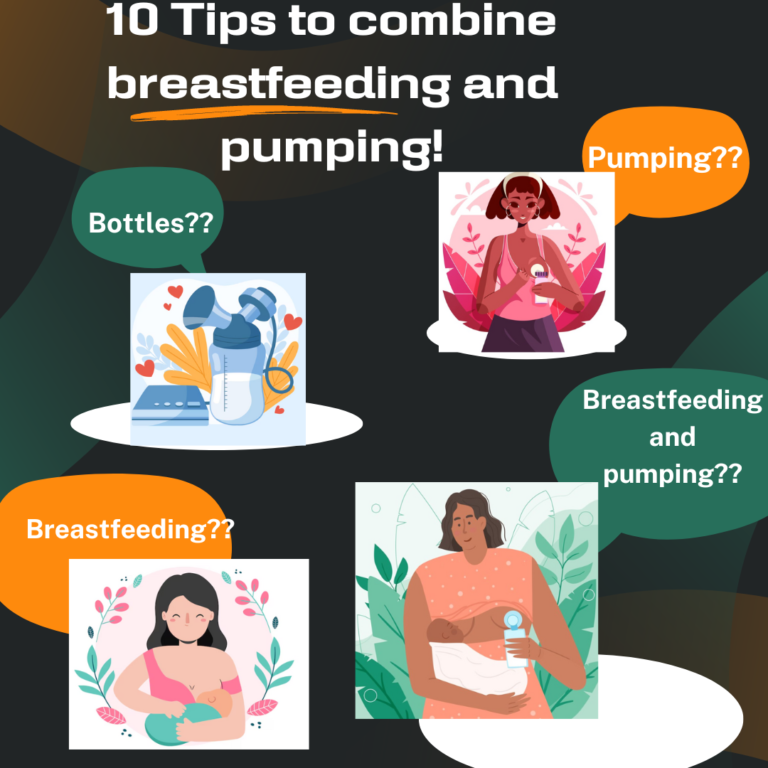Can you do 16/8 intermittent fasting while breastfeeding?

As a new mother, struggling with weight is very common!
We know how stressed or frustrated you are, repeatedly standing in front of the mirror, trying to fit into your old clothes, checking out your phone gallery to look at your picture-perfect photos, continuously searching for diet plans on YouTube, and feeling confused about how celebrities seem to regain their shape so quickly after delivery. And then, suddenly, multiple videos pop up on your social media feeds about 16/8 intermittent fasting.
Believe us, there’s a lot of buzz, but will this work? Especially if you’re a new mother? Let’s find out what the diet is, how it works, and what you can do with real-life experience.
What is 16/8 intermittent fasting?
“Intermittent fasting or time-restricted eating is one such diet where you can eat whatever you want (preferably healthy) but in a time-restricted mode “

Time-restricted fasting is best to lose extra weight or manage your weight effectively.
According to a study, Intermittent fasting can help mothers avoid the risk of gestational diabetes and improve heart health and cognitive function.
“The diet generally focuses on “when to eat” instead of “what to eat”.
In this fasting technique, you divide your 24 hours into two parts: One is for “eating” and another one for “fasting”.

Intermittent fasting is all about calorie deficit and time-restricted feeding. Generally, for non-pregnant women and others, it is recommended to reduce their calorie intake to 500 to 600 calories.
But, breastfeeding mothers need more calories to support their health as well as the growth of their baby. That is why they require more calories than any other non-pregnant women.
The exact amount of calories generally depends on the woman’s and baby’s health condition, age, weight, breastfeeding frequency, and activity levels. But the rule of thumb is to add around 330 to 400 extra “HEALTHY” calories for a healthy and regular breastfeeding mother.
Healthcare professionals use the Dietary Reference Intake Calculator to find the calorie needs according to your gender, height, weight, etc., by keeping in mind your baby’s health and your health.
How to do Intermittent fasting?
Intermittent fasting is one of the powerful weight loss tools if followed right.
Other than burning calories, intermittent fasting also helps in insulin resistance, and inflammation, improves heart health, brain health, and anti-aging.
Here’s the easiest and most sustainable way to do intermittent fasting:
- Pick an eating window and fasting window that suits your time.
- During the eating window, include a lot of seasonal vegetables, fruits, legumes, pulses, and lean protein, in your diet.
- During the fasting window, drink a lot of water, herbal tea, black coffee, or green tea to maintain your energy levels.
- Monitor how your body reacts to the fasting.

The key to intermittent fasting is your fasting and eating window. You can align your fasting widow with your sleeping time. By doing this, you won’t find the fasting window to be long and tiresome, thus incorporating intermittent fasting into your holistic lifestyle.
Note: While increasing your calories, you also must ensure your calories are well nourished with enough nutrients like protein, iron, calcium, folate, vitamin D, etc., Along with it, staying hydrated is also crucial. Aim to drink at least 3 to 4 liters of water every day.
Types of Intermittent Fasting:
There are 7 types of intermittent fasting. While choosing one, you have to consider your time, freedom, and your health. Having said that, here is the list of 7 intermittent fasting.
- 16/8 intermittent fasting: This is the most famous intermittent fasting type. In this, a person fasts for 16 hours and eats for 8 hours.
- 12/12 intermittent fasting: This type of intermittent fasting is best for beginners. Here, you eat for 12 hours and fast for the next 12 hours.
- Weekly two days intermittent fasting: You can eat for five days a week and fast for two days.
- Alternate Days Fasting: You eat one day and fast the next day
- One meal a day: You eat only one meal a day
- Water fasting: You drink only water for a set time to remove toxins from your body
- Juice Fast: One or two days a week, you drink only vegetable juice without any sugar

Note: To enhance your weight loss, try to eat less-calorie food, i.e., fruits, green vegetables, etc, and a lot of water, black coffee, black tea, green tea, etc.
Can you do 16/8 intermittent fasting while breastfeeding?
Yes, you can do intermittent fasting, after consulting with your healthcare professional, who is well aware of your health and your baby’s.
According to experts, 16:8 intermittent fasting while breastfeeding is generally not recommended, especially when your body has not recovered properly OR your baby’s health needs a consistent and nourishing intake of nutrients.

16:8 Intermittent fasting results burns calories quickly and negatively influences milk production by lowering the nutritional quality and quantity of nursing moms.
Furthermore, following 16/8 Intermittent fasting while breastfeeding can highly affect your energy levels, and can also lead to fainting and dizziness.
Another issue with intermittent fasting in new mothers is the hormonal shifts. When you give birth, your estrogen and progesterone levels will gradually decrease and oxytocin and prolactin will increase.
Note: Oxytocin and prolactin are responsible for milk production and ejecting it out of the breast through nipples.
Another major concern when it comes to intermittent fasting and breastfeeding is some mothers fail to take care of their hydration. If you are not drinking enough water, it will lead to extreme dehydration, which can reduce the fluids in your body resulting in low milk supply and quality.
Note: Breast milk contains 87% water, 3.8% fat, 1% protein, and 7% lactose, so it is important to keep a check on the body’s fluid intake and vitals like BP, etc.
How to do intermittent fasting while breastfeeding?
As already mentioned above, one of the major concerns of intermittent fasting while breastfeeding is the lack of education about the importance of nutrition. For breastfeeding mothers, it is important to take extra calories as they need to feed their babies while also maintaining their health.
However, if you are determined to lose weight without impacting your milk supply, here are some safe practices you must follow:
- Discuss your plans with your doctor.
- Start slowly, as sudden fasting will influence your milk supply.
- Focus on both macro and micronutrients
- Include a lot of healthy fruits, vegetables, etc in your diet
- Include a lot of water, healthy drinks, juices to ensure fluid intake
- Keep the weight stress away.
- Keep an eye on your body and milk supply
- Avoid doing vigorous exercises
- Gradually incorporate exercise like walking or light jogging
- Plan your meals to avoid maternal burnout.
Does fasting affect breast milk supply?
The direct answer to this question is “Yes”.
Intermittent fasting does affect breast milk supply. So it is better to first establish a milk supply before hopping into the diet by breastfeeding frequently, maintaining skin-to-skin contact, and draining the complete milk while nursing.

Unfortunately, when it comes to “intermittent fasting while breastfeeding”, not many studies have been conducted in the clinical sector.
But, as you already know your body will go through a rollercoaster ride of hormonal changes, and starting intermittent fasting can make you tired and frustrated.
The only way you can overcome this is by eating healthy food, providing better nutrition, micro and macro-nutrient-rich foods to your body with some mild exercises like walking, etc.,
Real-life experience of a mother doing intermittent fasting while breastfeeding
While researching intermittent fasting and breastfeeding and whether anyone experienced a positive outcome out of it, we came across this response on Reddit.
With 16:8 intermittent fasting, while breastfeeding intermittent fasting breastfeeding Reddit, this new mother has lost around 20 lbs(9 kg) in 3 months. During intermittent fasting, she followed a few things to keep her journey more fruitful:
- She established a proper milk supply before entering into the diet.
- Consulted her doctor and the baby’s pediatrician.
- During her eating window, she added a large number (by eating healthy) of calories.
- Keeping check on both her and the baby’s weight.
- She made sure the baby’s weight was growing.
So, if you want to make your journey more fruitful, then prioritize the above-mentioned points!
Intermittent fasting while breastfeeding schedule
Getting into intermittent fasting while breastfeeding requires many tweaks in your diet. Instead of blindly following anything from the internet, we will recommend you to visit your doctor. Discuss your plans and goals, ask for a proper diet, and their suggestions.
You must tailor your fasting schedule according to your body’s condition and needs. Personalize your regimen to suit your lifestyle and health goals:
- Consult your doctor on the baby’s health, sleeping, and feeding time, nutrition requirements, etc.
- Opt for the fasting method that your body can take.
- Include a lot of high-quality veggies, fruits, and fluids, and keep the fasting period mainly at night
- Keep an eye on milk supply and baby’s growth.

Is it safe to do intermittent fasting while breastfeeding?
Intermittent fasting while breastfeeding can be safe if you adjust the diet according to the baby’s needs, your body’s requirements, and your milk supply.
Research says short-term fasting and fluid abstention do not affect macronutrients ( lactose, protein, fat solids, triglycerides, cholesterol) in breast milk. However, it is highly not recommended to opt for long-term (24-hour) fasting, especially for new mothers!
Apart from this, we highly recommend you follow the above-mentioned steps (in previous sections) to keep your fasting journey safe for yourself and especially for your baby.
When to consult a Dietitian and your healthcare doctor?
You must consult a dietician or your healthcare provider as soon as you decide to start fasting. Intermittent fasting while breastfeeding can be dangerous if done wrong, so it is best to consult an expert before starting anything.
The expert will help you to plan the meal according to your health needs, milk supply, and the baby’s growth. The expert knows which food has the right amount of healthy calories, macro and micronutrients, fats, and lactose. So, it is best to consult your doctor and also your baby’s pediatrician before starting the fasting journey.
Conclusion
Intermittent fasting while breastfeeding is not a bad idea! But, having a proper strategy is important to maintain the health of you and your baby. While breastfeeding, abrupt dieting without a proper plan will reduce the milk supply and the needed nutrients associated with it.
So, make sure you have done your proper research and have already consulted your doctor. We hope you got a clear picture of intermittent fasting and breastfeeding, and we would love to know more in the comment section.
Frequently Asked Questions:
- Is intermittent fasting good for postpartum?
Intermittent is not good for postpartum as any small mistake can affect your milk’s quantity and quality. If you still want to follow, consider visiting your doctor for a proper plan.
- Does fasting dry up breast milk?
Yes, Fasting for a long period can reduce the milk supply. But fasting for short periods won’t affect your milk supply.
- How many hours can I fast while breastfeeding?
It is recommended to fast only for the short term or according to your body’s capability. Short-term fasting generally doesn’t impact the breast milk quantity and quality.











+ There are no comments
Add yours